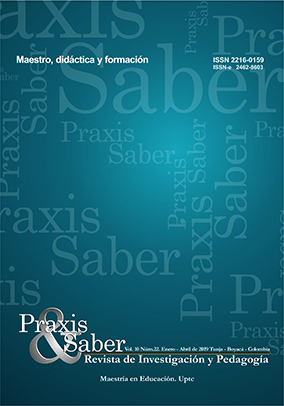Motivation of music students: School of Arts flute orchestra

Abstract
Motivation plays a key role in promoting the development of skills and abilities of students. Intrinsic motivation is generated as a result of the genuine interest of the individuals; extrinsic motivation is generated by external factors as a benefit or reward. In any case, teachers have the capacity to influence their students’ motivation. In October 2016 the Autonomous University of Chihuahua School of Arts Flute Orchestra was formed as part of the project called School of Arts Flute Orchestra: Inclusion and group work between students and teachers. Research project, aimed at impacting on the performance of flute students. By means of qualitative research, the present article shares the results of the first interviews with the nine members of the group regarding motivation. The results show that intrinsic motivation is predominant in the first instance and that students present skills development, problem solving, a decrease of stage fright, and progress in their academic learning arising therefrom.
Keywords
motivation, intrinsic motivation, extrinsic motivation, teaching-learning
Author Biography
Francia Terrazas-Bañales
Doctorado en Educación Musical una Perspectiva Multidisciplinar
Universidad Autónoma de Chihuahua (Chihuahua, México)
References
Balaguer, I., Castillo, I., & Duda, J. (2008). Apoyo a la autonomía, satisfacción de las necesidades, motivación y bienestar en deportistas de competición: Un análisis de la teoría de la autodeterminación. Revista de Psicología del Deporte, 17(1), 123-139.
Covarrubias, P. & Piña, M. (2004). La interacción maestro-alumno y su relación con el aprendizaje. Revista Latinoamericana de Estudios Educativos, 34(1), 47-84.
Elias, M., & Sánchez-Gelabert, A. (2014). Relación entre actitudes y acciones de aprendizaje de los estudiantes universitarios. Revista de Estudios e Investigación en Psicología y Educación, 1(1), 3-14. https://doi.org/10.17979/reipe.2014.1.1.17
Elizondo, A., Rodríguez, J., & Rodríguez, I. (2018). La importancia de la emoción en el aprendizaje: Propuestas para mejorar la motivación de los estudiantes. Cuaderno de pedagogía universitaria, 15(29), 3-11.
Ericsson, K. (1996). The acquisition of expert performance: An introduction to some of the issues. En K. Ericsson (Ed.), The road to excellence (pp. 1-50). Mahwah, NJ: Erlbaum.
Ericsson, K. (2006). The influence of experience and deliberate practice on the development of superior expert performance (Chapter 3). The Cambridge handbook of expertise and expert performance (pp. 685-705). https://doi.org/10.1017/CBO9780511816796.038
Ericsson, K., & Charness, N. (1994). Expert performance: Its structure and acquisition. American Psychologist, 49, 725-747. https://doi.org/10.1037/0003-066X.49.8.725
Ericsson, K., Krampe, R., & Tesch-Römer, C. (1993). The role of deliberate practice in the acquisition of expert performance. Psychological Review, 100, 363-406. https://doi.org/10.1037/0033-295X.100.3.363
Ericsson, K. & Lehmann, A. (1996). Expert and exceptional performance: Evidence for maximal adaptations to task constraints. Annual Review of Psychology, 47, 273-305. https://doi.org/10.1146/annurev.psych.47.1.273
Escobar, M. (2015). Influencia de la interacción alumno-docente en el proceso enseñanza-aprendizaje. Paakat: Revista de Tecnología y Sociedad, 5(8).
Fernández-Gámez, D., & Guerra-Martín, M. (2016). Aprendizaje inverso en formación profesional: Opiniones de los estudiantes. International Journal of Technology and Educational Innovation, 2(1), 29-37. https://doi.org/10.20548/innoeduca.2016.v2i1.1048
Fuertes, A., Ferrís, R., & Grimaldo, F. (2018). ¿Un cambio de metodología que aumente la satisfacción y motivación del estudiante favorece su aprendizaje? Experiencias en el aula. Actas de las Jenui, 3, 335-342.
García, F., & Doménech, F. (2002). Motivación, aprendizaje y rendimiento escolar. Reflexiones Pegadógicas, 16, 24-36.
Hallam, S., Rinta, T., Varvarigou, M., Creech, A., Papageorgi, I., Gomes, T., & Lapinekun, J. (2012). The development of practising strategies in young people. Psychology of Music, 40(5), 652-680. https://doi.org/10.1177/0305735612443868
Hernández, A., Silveira, Y., & Moreno, J. A. (2015). Adquisición de las competencias profesionales según el soporte de autonomía, mediadores psicológicos y motivación. Bordón, 67(4), 61-72. https://doi.org/10.13042/Bordon.2015.67406
Herrera, J. & Zamora, N. (2014). ¿Sabemos realmente que es la motivación? Correo Científico Médico de Holguín, 18(1), 126-128.
Hoffer, A. & Klotman, R. (1995). Foundations of Music Education. New York: Schirmer Books.
Howe, M., Davidson, K., Moore, D., & Sloboda, J. (1998). Innate talents: Reality or myth. Behavioral and Brain Sciencies, 21, 399-407. https://doi.org/10.1017/S0140525X9800123X
Kokotsaki, D. & Hallam, S. (2007). Higher education music students’ perceptions of the benefits of participative music making. Journal Title, 10(10), 1-3. https://doi.org/10.1080/14613800601127577
Lehmann, A. & Ericsson, K. (1997). Research on expert performance and deliberate practice: Implications for the education of amateur musicians and music students. Psychomusicology, 16, 40-58. https://doi.org/10.1037/h0094068
Lens, W., Matos, L., & Vansteenkiste, M. (2008). El profesor como fuente de motivación de los estudiantes: Hablando del qué y del porqué del aprendizaje de los estudiantes. Revista Digital de Investigación en Docencia Universitaria, 4(1), 1-9. https://doi.org/10.19083/ridu.4.9
Marín, R. (2003). El modelo educativo de la UACH: elementos para su construcción. Chihuahua: Universidad Autónoma de Chihuahua, Ed. Dirección de Extensión y Difusión Cultural.
Matos, R. (2006). La práctica de la reflexión durante el aprendizaje de un instrumento musical. Revista de Investigación, 59, 65-88.
Oriola-Requena, S., Gustems-Carnicer, J., & Filella-Guiu, G. (2018). Agrupaciones musicales juveniles: Modelos funcionales para la motivación académica de los adolescentes. REIRE Revista d’Innovació i Recerca en Educació, 11(2).
Ospina, J. (2006). La motivación, motor del aprendizaje. Revista Ciencia de la Salud, 4, 158-160.
Papageorgi, I., Hallam, S., & Welch, G. (2007). A conceptual framework for understanding musical performance anxiety. Research Studies in Music Education, 28, 83-107. https://doi.org/10.1177/1321103X070280010207
Polanco, A. (2005). La motivación en los estudiantes universitarios. Actualidades Investigativas en Educación, 5(2), 1-13.
Ryan, R. & Deci, E. (2000). La teoría de la autodeterminación y la facilitación de la motivación intrínseca, el desarrollo social, y el bienestar. American Psychological Association, 55(1), 68-78. https://doi.org/10.1037/0003-066X.55.1.68
Silva, T. (2016). Estrategias motivacionales que permitan mejorar la adaptación de los estudiantes en el proceso enseñanza aprendizaje. Machala: Universidad Técnica de Machala
Tedesco, J. (2011). Los desafíos de la educación básica en el siglo XXI. Revista Iberoamericana de Educación, 55, 31-47.
